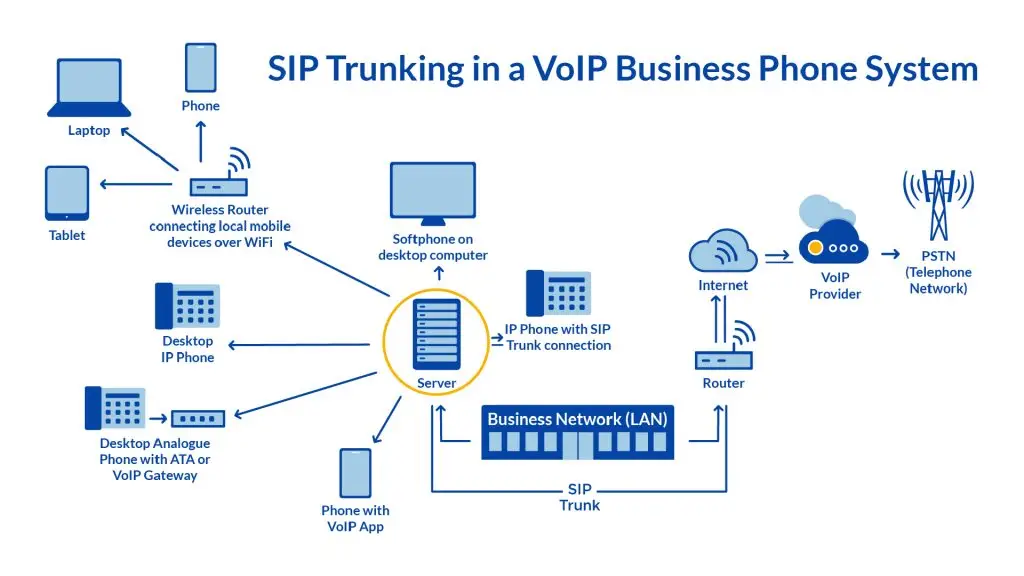What is an IP telephone system?

The Convenience and Flexibility of an IP Telephone System
In the realm of business communication, the IP telephone system has emerged as a game-changer. It’s a digital phone system that leverages the internet for transmitting voice data.
But what exactly is an IP telephone system? How does it differ from traditional landline phones?
This article aims to answer these questions. We’ll delve into the workings of IP telephone systems and their role in modern communication.
We’ll also explore the benefits of these systems for businesses. From cost savings to advanced features, IP telephone systems offer numerous advantages.
Whether you’re a business owner, an IT manager, or simply interested in communication technologies, this guide will provide valuable insights.
So, let’s embark on this journey to understand IP telephone systems and their impact on business communication.
Understanding IP Telephone Systems
An IP telephone system, also known as Internet telephony, is a technology that converts voice communications into data. This data is then transmitted over the internet.
Unlike traditional phone systems, IP telephony doesn’t rely on physical phone lines. Instead, it uses the internet as a medium for voice data transmission.
This technology is based on VoIP (Voice over Internet Protocol). VoIP is the backbone of IP telephony, enabling voice data to travel over the internet.
The Basics of IP Telephony
IP telephony works by converting voice signals into digital data. This data is then broken down into packets.
These packets are sent over the internet to the recipient. At the receiving end, the packets are reassembled and converted back into voice signals.
This process happens in real time, allowing for seamless communication over long distances.
How IP Systems Differ from Traditional Phones
Traditional phone systems, or landlines, use copper wires to transmit voice data. They require physical connections between the caller and the receiver.
On the other hand, IP telephone systems use the Internet for data transmission. They don’t require physical phone lines, making them more flexible and scalable.
Moreover, IP systems offer advanced features that traditional phones lack. These include voicemail to email, call forwarding, and auto-attendant, among others.
The Technology Behind IP Telephone Systems
The technology behind IP telephone systems is complex yet fascinating. It involves several components working together to ensure seamless communication.
The core technology is VoIP, which enables voice data to travel over the internet. Other components include SIP trunking, codecs, and network infrastructure.
SIP trunking is a protocol that enables voice data to be sent over the internet. Codecs, on the other hand, are used to compress and decompress voice data.
The network infrastructure plays a crucial role in the performance of an IP telephone system. It must be robust and reliable to ensure high-quality voice communication.
VoIP: The Core of IP Telephony
VoIP stands for Voice over Internet Protocol. It’s the technology that enables voice data to be sent over the internet.
VoIP works by converting voice signals into digital data. This data is then sent over the internet to the recipient.
At the receiving end, the data is converted back into voice signals. This process happens in real-time, ensuring seamless communication.
Data Transmission in IP Telephony
Data transmission in IP telephony involves several steps. First, voice signals are converted into digital data.
This data is then broken down into packets. These packets are sent over the internet to the recipient.
At the receiving end, the packets are reassembled and converted back into voice signals. This process ensures high-quality voice communication over the internet.
Advantages of IP Telephone Systems for Businesses
IP telephone systems offer numerous advantages for businesses. They can transform the way companies communicate, leading to improved efficiency and productivity.
One of the main benefits is cost savings. IP telephone systems are typically more affordable than traditional phone lines.
They also offer scalability. This means businesses can easily add or remove phone lines as needed.
Other benefits include advanced features and integration capabilities. These can enhance business communication and streamline workflows.
Here are some key advantages of IP telephone systems for businesses:
- Cost savings
- Scalability
- Advanced features
- Integration capabilities
- Improved communication
- Enhanced productivity
Cost Savings and Scalability
One of the main advantages of IP telephone systems is cost savings. They eliminate the need for expensive hardware and maintenance costs associated with traditional phone lines.
IP telephone systems also offer scalability. This means businesses can easily add or remove phone lines as their needs change.
This flexibility can be particularly beneficial for growing businesses. It allows them to adapt their communication system as they expand.
Advanced Features and Integration
IP telephone systems come with a range of advanced features. These include voicemail to email, call forwarding, and auto-attendant.
These features can enhance business communication and streamline workflows. They can also improve customer service and satisfaction.
In addition, IP telephone systems can be integrated with other business applications. This can further enhance productivity and efficiency.
Choosing the Right IP Telephone System
Choosing the right IP telephone system is crucial for businesses. The right system can enhance communication, improve productivity, and lead to cost savings.
However, the wrong system can lead to communication issues and increased costs. Therefore, businesses need to carefully consider their needs and options.
There are several factors to consider when choosing an IP telephone system. These include the type of system, the features it offers, and the vendor’s reputation.
On-Premises vs. Cloud-Based Systems
There are two main types of IP telephone systems: on-premises and cloud-based. On-premises systems are installed and managed on-site.
Cloud-based systems, on the other hand, are hosted by a service provider. They can be accessed from anywhere with an internet connection.
Both types have their pros and cons. Businesses need to consider their specific needs and resources when choosing between them.
Factors to Consider When Selecting a System
When selecting an IP telephone system, businesses should consider several factors. These include the system’s features, cost, scalability, and vendor support.
They should also consider the system’s integration capabilities. This is particularly important for businesses that use other digital tools and applications.
Finally, businesses should consider the vendor’s reputation. They should look for a vendor that is reliable, has a good track record, and offers excellent customer support.
Implementing an IP Telephone System
Implementing an IP telephone system involves several steps. It starts with planning and ends with testing and deployment.
During the planning phase, businesses need to assess their current communication needs. They also need to consider their future needs, especially if they plan to grow or expand.
Once the planning phase is complete, businesses can move on to the implementation phase. This involves installing the system, configuring it, and training staff on how to use it.
Preparing for the Transition
Preparing for the transition to an IP telephone system is crucial. Businesses need to ensure that their network infrastructure can support the new system.
They also need to train their staff on how to use the new system. This can involve providing manuals, conducting training sessions, and offering ongoing support.
Finally, businesses need to test the system before fully deploying it. This can help identify any issues or problems that need to be addressed.
Overcoming Potential Challenges
Implementing an IP telephone system can come with challenges. These can include technical issues, resistance from staff, and unexpected costs.
To overcome these challenges, businesses need to plan carefully. They need to anticipate potential issues and have a plan in place to address them.
They also need to communicate clearly with their staff. This can help alleviate any concerns or resistance to the new system.
The Future of IP Telephone Systems
The future of IP telephone systems is promising. With advancements in technology, these systems are becoming more sophisticated and versatile.
They are also becoming more accessible. As more businesses recognize the benefits of IP telephony, the demand for these systems is expected to grow.
In addition, the rise of remote work is likely to further fuel the adoption of IP telephone systems. These systems can support remote and mobile workers, making them an ideal solution for the modern workplace.
Emerging Trends and Technologies
Several trends and technologies are shaping the future of IP telephone systems. One of these is the integration of artificial intelligence and machine learning.
These technologies can enhance the functionality of IP telephone systems. For example, they can be used to improve call routing, voice recognition, and customer service.
Another trend is the use of 5G technology. This can enhance the performance of IP telephone systems, particularly in terms of call quality and reliability.
Staying Ahead in Business Communication
To stay ahead in business communication, businesses need to keep up with the latest trends and technologies. This includes staying informed about advancements in IP telephony.
They also need to be willing to adapt and evolve. This might involve upgrading their IP telephone system or integrating new features and functionalities.
Finally, businesses need to prioritize user experience. This involves choosing an IP telephone system that is user-friendly and provides a high-quality communication experience.

